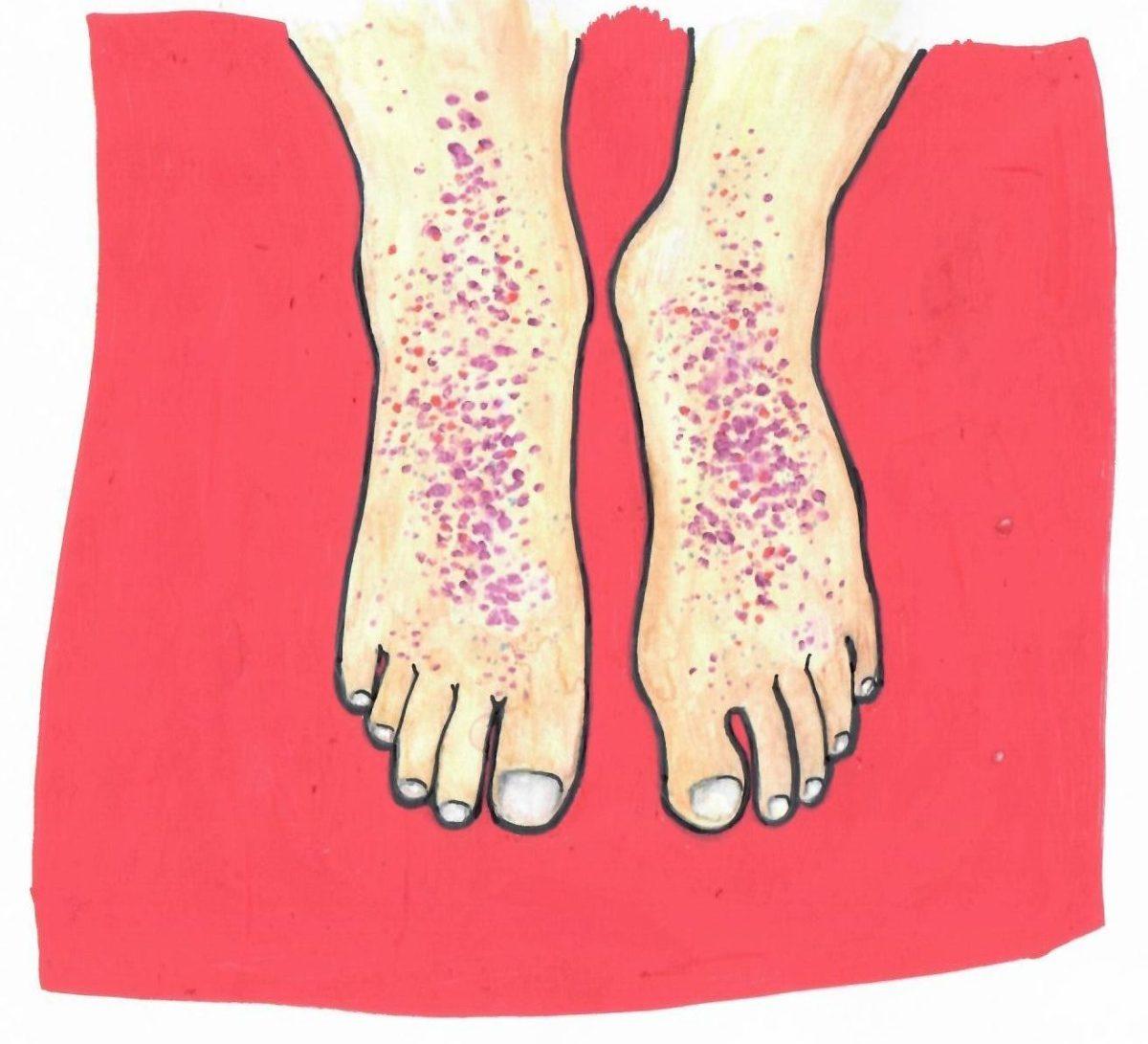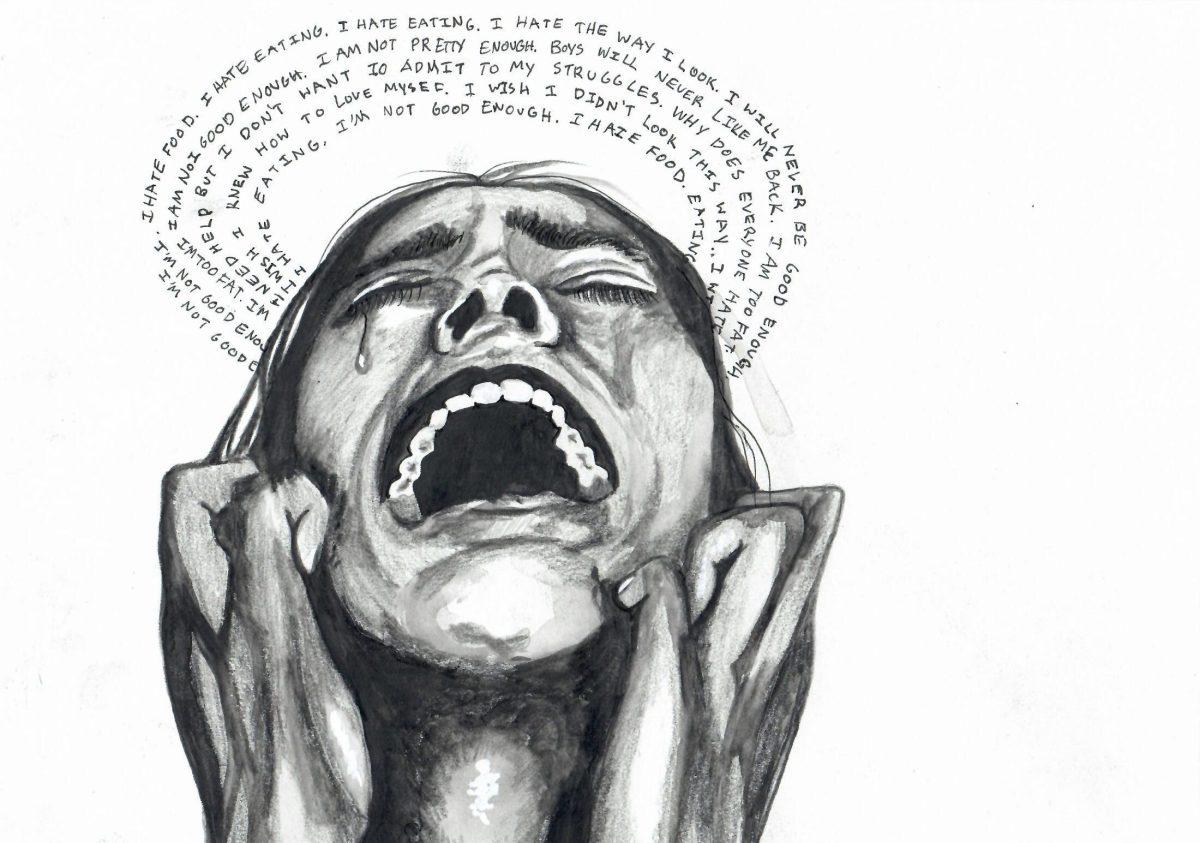Ellen Ripley sets off to rescue Newt, a little girl she has developed a mother-daughter relationship with, from a spaceship on planet LV-223, which is riddled with aliens. She enters an elevator as it descends rapidly to the basement floor. Alarms blare as the countdown commences: “You now have 15 minutes to reach a minimum safe distance.” Ripley readies herself with a myriad of firearms and ammunition amid the self-destruction of the ship surrounding her. In a cold sweat, she mentally prepares herself for the battle thatlies ahead. A scenario plays on repeat in her mind: retrieving Newt. The elevator doors open to reveal smoke rising from the grates of the ship. Ripley continues with the utmost determination to save the girl. She is a fearless nomad on a dangerous journey and a woman who does not doubt herself.
—
I approach the jam line geared up, head-to-toe, in a place I’ve called my home-away-from-home for many years. The crowd roars with cheers of encouragement and praise. The applause becomes a lull as I focus on a game plan, just as Ripley did on her quest to recover Newt. Anxious thoughts of doubt immediately dissipate as waves of pure adrenaline course through my veins. I have but one thing buzzing about my mind — to reach the other side of the pack, it is as though the hangar is empty with only me and the four opponents I will soon face. I will skate forward, then juke left and right in one fell swoop of motion. As I wait for the whistle to blow, signaling that I can proceed, I feel invincible with all sights set forward. The shrill whistle pierces the crowded air.

Since I was 9 years old, the fictitious protagonist Ripley, featured in the science fiction series “Alien,” has inspired me to trust my gut and follow my instincts. Through the eyes of a little girl, she was a figure of absolute strength and femininity. Ripley didn’t rely on a man to defend her, nor was she a sexualized super-being. She was a woman. I didn’t fully grasp the impression she had left on me until later in life. But because of her, at an early age, my eyes opened to worlds of possibility. When I began to learn how to express myself, I leaned on Ripley for support, knowing that I could count on her throughout my youth. Ripley’s confidence in herself and my desire to persevere are what drove me to embrace my girlhood. I channeled her during my climbing-trees-while-covered-in-dirt-while-posing-as-a-spy phase. I channeled her during my mismatch-every-piece-of-clothing-I-wore-in-elementary-school phase. I even channeled her during my pay-no-mind-to-what-others-think, be-a-rebel-girl phase. Bottom line is, I’ve had plenty of phases and am just now coming to terms with the person I want to be. Not for Ripley, but for me.
“Ripley’s confidence in herself and my desire to persevere are what drove me to embrace my girlhood.”
Growing up without a mother, I looked up to Ripley’s stoic independence and drew reassurance from it. Ripley was, by no means, a woman known to shy away from taking difficulties into her own hands. In “Alien”, she was the sole survivor of a spaceship called the Nostromo, which was ravaged by a creature so ominous one could only imagine. She stopped at nothing to escape alive. I idolized the phrase, “If she can do it, I can too.”
Since I was old enough to roller skate, my dad and aunt would drive me across town to Oaks Park Roller rink. I’d run ahead of them to the counter at the rink, with the musty smell waiting stagnant in the air. I’d stand on my tippy toes and request my very own pair of battered rental skates. When I’d lace them up, an unfamiliar feeling would flood my thoughts and radiate through my giddy expressions. It was a rush I had only experienced while hopping on the wooden track to skate in circles with nothing but curiosity to urge me onward. It was days like those that prompted me to be a roller girl, but I just needed one last boost of encouragement to send me on my way. I could close my eyes, and in my mind, picture a blonde-haired and blue-eyed girl racing around a track in a flash, with a pair of purple skates and eccentric, knee-high socks, entirely her own. And on a sunny afternoon, after hours of rosy-cheeked frenzies, I’d meet Ripley, my icon to be, in the “Alien” movie. She reminded me of the mirage that lived in my mind, unstoppable. Little did I know that my illusion was merely a glimpse of my future. Ripley was the catalyst I longed for, all along. In no time at all, I’d go on to try out for the Voodoo Dolls, a junior team within the Rose City Rollers roller derby league. I was welcomed with open arms. My derby alias, Ruby Slip-Hers, inspired by the famed Dorothy from “The Wizard of Oz”, would become the name I’d answer to for many years to come.
I became close friends with a more experienced derby girl, Lil’ Nightmare, who I’d play with for hours on end. As we got a bit older, our obsession with movies flourished. We’d binge science fiction and adventure films like “The Lord of the Rings” and “Star Wars” together until our eyes went dry. My friends and I bonded over movie nights as I questioned the construct of “girl movies” in my mind. Was there such a thing? Just because “Cinderella” and “Beauty and the Beast” weren’t let in on my movie nights, didn’t mean I thought any less of those films — I just preferred to watch “Indiana Jones”.
In all the pop culture I’d devour, one thing in common was the muscular white man at the center of attention, hogging the spotlight and posing as a hero in an imaginary world. In my world, those men wouldn’t be protecting a damsel in distress. In my world, a damsel in distress wouldn’t exist. Unless, of course, a woman was doing the saving, but I suppose a fellow in distress would be more fitting. It seemed foreign for a woman like Ripley to play a hero’s role because these falsehoods had so obviously become a trend in Hollywood filmography. It was as though they were avoiding reality with stereotypical ploys to deceive the public into believing there is only one kind of woman. The one character that stuck out the most to me among the schemes of a “man’s world” was Ripley.
As a kid, with a lucid image of Ripley’s courage in my head, I was fortunate enough to have an extremely gifted Halloween costume seamstress in my life. I’d dress in elaborate disguises transposing me into powerful female forces like Tank Girl, Joan Jett, and, of course, Ripley. Fantastical or not, I aspired to be like them. But in every ensemble, I would rarely falter to include a twist unique to me: roller skates. Every moment I spent enthralled by a screen as a kid affected me and shaped into who I am today. The film industry played a substantial role in my youth. It educated my younger self about a new world of creativity, freedom of expression and roles akin to Ripley’s. But the industry also subjected me to the constant exposure of strong men on screen, and, not so commonly, strong women. Fortunately, there were role models in my life, like Ripley, to expose the fallacies of this picture.
As I’ve matured, I’ve noticed a spike of female characters as protagonists in the film industry, which excites me beyond belief. But with many of the movies I’ve seen, men hide behind the woodwork and pull the strings to please the public. Today, it’s still more common for a man to direct a film than a woman. With the uprise in demand for more of an authentic representation of women, the directors abide, but mostly to enhance their personas, not to bring more Ripleys into the world. It’s taxing to wonder if what plays out on screen was produced earnestly or not. When I was new to the universe of cinema, my kid self was too enthralled by the plot that unfurled on-screen to question the writer’s accountability for the narrative with a man in the limelight. I wish, now, that I had felt more inclined to uncover the answers sooner. There was a part of my younger self who aspired to leap inside the screen and wholeheartedly tackle the role a woman could play just as effortlessly as a man. It was disappointing to be presented with these false hopes when all I sought was sensibility.
“I trusted the part of me that knew I could do it.”
When I was first introduced to the Alien series, at a young age, I never found myself questioning it’s integrity or the intent behind Ripley’s character. She was nowhere near a crooked intent to me, but instead, the woman who vocalized the concept that I had the capability to do things on my own. If it wasn’t for her, I wonder if I would’ve begun my roller derby journey as early as I did. I reflect on my younger years as a means for growth, and with time I’m accompanied by the courage from myself and Ripley to reach the top of every mountain. In the summer of 2019, I tried out for a team a bit more esteemed than the Voodoo Dolls: the Female Division USA team. Any hesitation I felt going into the tryout disappeared as I reminisced about the scenes of Ripley, time and time again, never ceasing to conquer an obstacle in her path. She never looked back, and as I was instructed to display my skills to my soon-to-be coaches, with years of practice in my toolbox, I saw no sense in turning back either, and I trusted the part of me that knew I could do it.

For the brief time I’ve walked the earth, I have not once lost hope that there will be a day when I’ll change the channel and lay eyes on a scene that was not built of lies, but of truth, so genuine that I laugh. As unreal as the plot of the “Alien” series may appear, the truth I chase runs deep. As a girl, I knew, but as a woman, I know, that it’s evident the world is lacking independent characters like Ripley. I’ve become my own vision of independence, embracing both my strengths and weaknesses. All the time I’ve devoted towards my passions—roller derby, writing, film—my bond with Ripley has only intensified our commonalities. Since 1979, she’s carried the torch of change. From the get-go, I understood she would be the archetype for the future of femininity in film, and my whole life, I’ve trusted the power Ripley bestows.
In her element, she urges I aid the world on the road to a more genuine reality. Film underrepresents autonomous women, but I am among those characters, and there are oceans of women alike in the world. Maybe the truth I pursue has stood by my side, all along, and the film industry is just trying, lackadaisically to match our zeal. Independence is reality, and television is an illusionary deceit. I am grounded by my knowledge of how to distinguish between the fine lines that separate the truth from the lies. Everyday, I praise Ripley for the doors she helped me open. As time passes, I drift farther away from the reliance I have on her, but I will always feel inspired by the woman she will always be. If I close my eyes now, I picture a version of my future self standing tall, head held high with no one to lean on but myself.



































